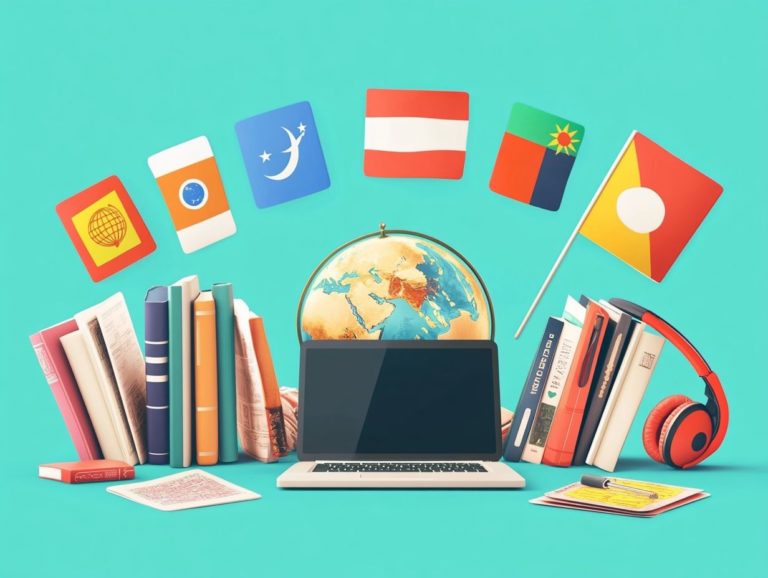10 inspiring language immersion success stories
Language immersion has the potential to transform your life in ways you might never have envisioned. Whether your goal is to achieve fluency in a new language, unlock career opportunities abroad, or deepen your cultural understanding, the benefits are extensive. Start your journey now and unlock exciting possibilities!
This article delves into ten inspiring success stories that showcase how immersion experiences have enabled individuals to overcome language barriers, build confidence, and forge meaningful connections. Explore these narratives and discover how you can embark on your own language journey!
Contents
- Key Takeaways:
- 1. Achieving Fluency in a New Language
- 2. Landing a Dream Job Abroad
- 3. Making Meaningful Connections with Locals
- 4. Opening Up Career Opportunities
- 5. Overcoming Language Barriers While Traveling
- 6. Enhancing Cultural Understanding and Appreciation
- 7. Improving Cognitive Skills and Memory
- 8. Gaining a Competitive Edge in the Job Market
- 9. Building Confidence and Self-Esteem
- 10. Experiencing a New Culture in a Deeper Way
- How Can Language Immersion Benefit You?
- What Are the Different Types of Language Immersion Programs?
- What Are the Best Countries for Language Immersion?
- How Can One Prepare for a Language Immersion Experience?
- What Are the Challenges of Language Immersion?
- How Can One Continue to Use and Improve Their Language Skills After Immersion?
- Frequently Asked Questions
- What is language immersion?
- How do language immersion programs work?
- What are the benefits of language immersion?
- Are there any success stories from language immersion programs?
- Can language immersion programs be done for any language?
- Do you need to have prior knowledge of the language to participate in a language immersion program?
Key Takeaways:

Language immersion can lead to fluency in a new language, opening up career opportunities and making meaningful connections with locals. It enhances cultural understanding, improves cognitive skills, and builds confidence. To prepare for a language immersion experience, research the best countries, be open to challenges, and actively seek ways to continue using and improving language skills after immersion.
1. Achieving Fluency in a New Language
Achieving fluency in a new language is a transformative journey that opens doors to your success and enhances your personal growth. It helps you understand better diverse cultures.
At language schools like Speak Language Center, you ll immerse yourself in the English language through experiences specifically designed to bolster your persistence and provide effective support from dedicated teachers. This model focuses on continuous use of the target language in real conversations, ensuring you develop practical skills in a welcoming atmosphere.
By participating in immersion programs, you’ll find yourself surrounded by native speakers and cultural contexts that enrich your understanding. Exploring 5 interactive language immersion experiences can enhance your journey. Persistence becomes your secret weapon as you navigate challenges and celebrate every small victory along the way.
The effective support from passionate educators boosts your learning; they offer tailored feedback and encouragement that make a real difference. Many successful students share that close interactions with the language and guidance from their teachers transformed their skills.
One graduate put it perfectly: “The real-life practice made all the difference; it was more than just learning it was living the language.”
This dynamic approach fosters a vibrant community of learners, all striving for fluency together.
2. Landing a Dream Job Abroad
Landing your dream job abroad is becoming more achievable than ever for bilingual individuals. Language education significantly enhances your value in the global job market, opening up better career opportunities.
With the ability to communicate effectively across cultures, you position yourself as a strong contender when applying for roles that involve interaction with international clients or teams.
Take, for example, a marketing professional fluent in Spanish you might secure a position with a multinational company eager to expand its footprint in Latin America. Likewise, an engineering graduate proficient in Mandarin could land a role with a tech firm looking to establish partnerships in China.
Being proficient in a second language not only makes you more attractive to employers but often translates into higher starting salaries and increased responsibilities, highlighting the substantial benefits that come from acquiring such skills.
3. Making Meaningful Connections with Locals
One of the most rewarding parts of learning a new language is connecting with locals! It fosters genuine conversations and enriches cultural exchanges in ways that go far beyond basic vocabulary.
When you learn a new language, you re not just memorizing words; you re building trust and understanding with others.
This experience helps you discover local customs and values, leading to stronger connections.
As you navigate these interactions, the intercultural benefits become clear. You ll find that language exposure gives you the power to appreciate diverse perspectives, crafting a shared space for dialogue that nurtures relationships and promotes harmony within the community.
4. Opening Up Career Opportunities
Acquiring language fluency opens up a world of career opportunities. It gives you a significant edge as employers increasingly seek candidates with practical skills in multiple languages.
The demand is skyrocketing in sectors such as healthcare, technology, and international business. Effective communication can lead to better patient outcomes, innovative collaborations, and successful negotiations.
A report from the New American Economy reveals that bilingual employees can earn up to 20% more than their monolingual counterparts. Research from the Economist indicates that 75% of employers prioritize foreign language skills in their hiring processes, showcasing the competitiveness that fluency brings to job seekers.
As globalization continues to shape the workplace, being bilingual enhances your resume and distinguishes you in a crowded job market. Start learning a new language today to unlock these amazing opportunities!
5. Overcoming Language Barriers While Traveling
Overcoming language barriers while traveling is crucial for enhancing your experience. It transforms challenges into valuable opportunities for language practice and a richer connection with the local culture.
You ll discover that community support is vital in bridging these gaps. Engaging with locals through creative endeavors like art workshops or cooking classes encourages active communication and nurtures trust and understanding.
For example, one traveler recounted how participating in a community mural project in Guatemala helped her forge friendships and pick up essential Spanish phrases, making it easier to navigate the town.
Similarly, another traveler shared how joining a local language exchange group transformed his trip to Japan. It allowed him to connect with residents and fully immerse himself in the vibrant culture. Don’t hesitate start overcoming language barriers on your next adventure!
6. Enhancing Cultural Understanding and Appreciation

Enhancing your cultural understanding and appreciation through language education helps you feel like a part of the world. It shapes you into an empathetic learner who celebrates diversity.
Such programs provide immersive experiences, allowing you to engage with different cultures on a profound level. They bridge gaps and forge connections that transcend language barriers.
As you navigate new environments and interact with local communities, you gain invaluable insights into traditions, customs, and worldviews. This firsthand exposure enriches your linguistic abilities and fosters respect for diverse perspectives.
Advocating for education is essential in promoting these transformative language studies. It helps cultivate a future generation that learns new languages and appreciates the rich tapestry of human experiences they represent. Embrace cultural understanding today!
7. Improving Cognitive Skills and Memory
Improving your cognitive skills and memory is a remarkable benefit of language learning. Research indicates that bilingual individuals often outshine their monolingual peers academically.
You gain this advantage by engaging with multiple languages, which requires heightened brain activity and extraordinary adaptability.
Studies suggest that as a language learner, you develop superior problem-solving skills, adeptly navigating the complexities of switching between different linguistic structures.
Cognitive psychology provides compelling evidence that bilingualism boosts your working memory, which is essential for planning, focusing, and remembering information.
A study published in the journal Cognition reveals that bilingual children consistently score higher on tests of executive function, illustrating the profound connection between language acquisition and enhanced cognitive frameworks vital for academic excellence. Start your language learning journey to unlock these cognitive benefits!
8. Gaining a Competitive Edge in the Job Market
Gaining a competitive edge in today s job market is essential for you as a modern professional. Honing strong language skills can significantly elevate your employability and career trajectory.
In an increasingly globalized world, your ability to communicate in multiple languages can unlock opportunities across various sectors, from international business and healthcare to tourism and education.
For example, if you re bilingual in English and Spanish while working in the tech industry, you may find yourself uniquely suited for roles that require customer support for a diverse clientele.
Similarly, in the finance sector, being able to converse in Mandarin can be a tremendous advantage as financial institutions broaden their reach into Asian markets.
Many people share success stories illustrating how language proficiency not only enhances communication but also fosters deeper connections and builds trust ultimately propelling you into leadership roles and enriching your professional journey.
9. Building Confidence and Self-Esteem
Building confidence and self-esteem through language learning is essential. It enables you to express yourself and engage effectively with others.
In a nurturing environment where teachers provide unwavering encouragement and cultivate a welcoming atmosphere, you ll feel empowered to take risks with your language skills.
This setting promotes open communication and fosters a deep sense of belonging among students.
Consider a shy student who, under the guidance of a compassionate teacher, evolves from hesitant speech to confidently presenting in front of the class.
These success stories demonstrate how encouragement can lead to significant personal growth, allowing learners like you to embrace new cultures and explore unique language immersion experiences that forge meaningful connections.
10. Experiencing a New Culture in a Deeper Way
Experiencing a new culture on a deeper level is one of the most rewarding aspects of language immersion. It allows you to engage in authentic interactions and meaningful exchanges.
Such experiences where you fully engage with the language and culture open doors not just to mastering the language, but also to embracing the nuances of local customs and traditions.
Many students recount transformative journeys. For instance, one discovered the joy of sharing meals with host families, realizing how food served as a bridge connecting diverse backgrounds.
Another shared how participating in local festivals offered insight into vibrant community dynamics, leading to friendships that lasted well beyond the experience.
These experiences show how much language exposure enriches your understanding of different cultures, facilitating a profound appreciation for the intricate tapestry of human connections across cultures.
How Can Language Immersion Benefit You?
Language immersion stands out as an exceptionally effective educational model. It equips you with the tools necessary to thrive in language education and reap significant academic rewards.
By immersing yourself in an environment where you consistently engage with the target language, you not only accelerate your language acquisition but also enhance your adaptability and cultural awareness.
As you explore diverse subjects through this new language, you gain a richer understanding of context and nuanced communication. This immersive experience fosters meaningful connections with peers and educators, enriching your social skills and encouraging collaboration.
Don’t wait! Start your journey today to unlock new opportunities. Participating in such programs leaves you better prepared to navigate real-world interactions, making language proficiency a valuable asset in both your personal and professional life.
What Are the Different Types of Language Immersion Programs?

Language immersion programs cater to your learning needs. They range from structured curricula in language schools to community initiatives that encourage interactive engagement.
These programs use engaging methods like total physical response, a method that uses physical movement to help learn language, and project-based learning. They immerse you in a rich language environment.
Some programs focus on real-world applications through cultural activities. You can enjoy hands-on experiences such as cooking classes or local festivals that reinforce your linguistic skills.
Technology plays a vital role in your learning journey. A wealth of online resources and interactive platforms are available to supplement traditional methods.
By integrating diverse educational tools and culturally relevant materials, these immersion programs not only enhance your vocabulary and grammar but also cultivate a deeper appreciation of the language within its cultural context.
What Are the Best Countries for Language Immersion?
Choosing the best countries for language immersion can profoundly impact your learning experience. These countries immerse you in rich cultural contexts and provide ample opportunities for genuine interactions.
Such environments refine your linguistic skills and deepen your understanding of local customs, traditions, and ways of life.
For instance, Spain is renowned for its vibrant culture and boasts numerous language schools in cities like Madrid and Barcelona. Here, you can savor delicious tapas while practicing your Spanish.
Similarly, France, with its picturesque landscapes and artistic heritage in places like Paris, offers a stunning backdrop for immersive learning.
Cities in Japan, like Tokyo and Kyoto, present unique opportunities to engage with the Japanese language, combining modernity and tradition.
In Japan, you can explore traditional tea ceremonies and local festivals, all while enhancing your language proficiency.
How Can One Prepare for a Language Immersion Experience?
Get ready to dive into your language immersion experience! Preparation is key to maximizing the benefits of learning a new language. This involves practical steps that utilize educational resources and the support of dedicated teachers.
Establishing clear goals is essential. This gives you both direction and motivation throughout your journey. Think about specific objectives, such as achieving conversational fluency or mastering a particular set of vocabulary.
Being attuned to cultural nuances can enrich your interactions. Language is often intertwined with the culture it springs from. Engaging with local customs, idioms, and social norms will greatly enhance your experience.
Make sure to take advantage of various educational resources, like online courses, language exchange programs, or community classes. These offer valuable insights and practice opportunities to truly make the most of this immersive adventure.
What Are the Challenges of Language Immersion?
Language immersion brings a host of challenges, notably the need for persistence and the development of effective support systems to navigate the learning curve successfully.
You may grapple with feelings of homesickness, as stepping away from familiar surroundings can evoke a sense of isolation. Language anxiety, or the fear of speaking a new language, can make conversing feel intimidating, which stalls your progress.
To counter these hurdles, it’s crucial to establish a routine that incorporates regular language practice. Engaging with local community groups or online forums can help create supportive relationships, boosting your confidence in speaking.
Utilizing resources like language exchange partners offers practical opportunities for conversation. Sharing experiences with others in similar situations can mitigate loneliness and foster resilience.
How Can One Continue to Use and Improve Their Language Skills After Immersion?
Continuing to refine your language skills after immersion is vital for getting better over time. You can accomplish this through consistent practice and by tapping into a wealth of educational resources.
Cultivating a strong support system within the community is key to your journey. Engaging with native speakers builds your confidence and enhances your conversational skills.
Consider joining local language clubs or online forums. They provide excellent avenues for regular practice, allowing you to discuss various topics and share experiences.
Explore the power of language resources! Mobile language apps, online courses, and local libraries offer invaluable materials that reinforce your learning.
By combining these methods, you will sustain your language fluency and continually expand your vocabulary and comprehension. This paves the way for deeper cultural connections and enriching communication experiences. Start using these methods today to boost your skills!
Frequently Asked Questions
What is language immersion?

Language immersion means being fully surrounded by the target language and culture. Learners are immersed in daily activities using the target language, rather than just in a classroom setting.
How do language immersion programs work?
Language immersion programs typically involve living in a country or community where the target language is spoken. Participants attend classes taught in the target language and engage in cultural activities for a more natural learning experience.
What are the benefits of language immersion?
Language immersion improves language proficiency, cultural understanding, and overall cognitive development. It also builds confidence and adaptability in new environments.
Are there any success stories from language immersion programs?
Yes, numerous success stories exist. Many individuals achieve fluency and cultural fluency through immersion, utilizing their language skills in personal and professional contexts. For those looking to enhance their experience, consider these 5 essential tips for language immersion success.
Can language immersion programs be done for any language?
Absolutely! Language immersion programs are available for a wide range of languages, including popular ones like Spanish, French, and Mandarin, as well as less commonly taught languages like Arabic, Russian, and Korean.
Do you need to have prior knowledge of the language to participate in a language immersion program?
No, prior knowledge of the language is not always necessary. However, some programs may have language proficiency requirements, so it s important to research and choose a program that aligns with your current level of ability.
Ready to start your language learning journey? Discover 5 effective language immersion techniques and share your experiences or begin your immersion today!






